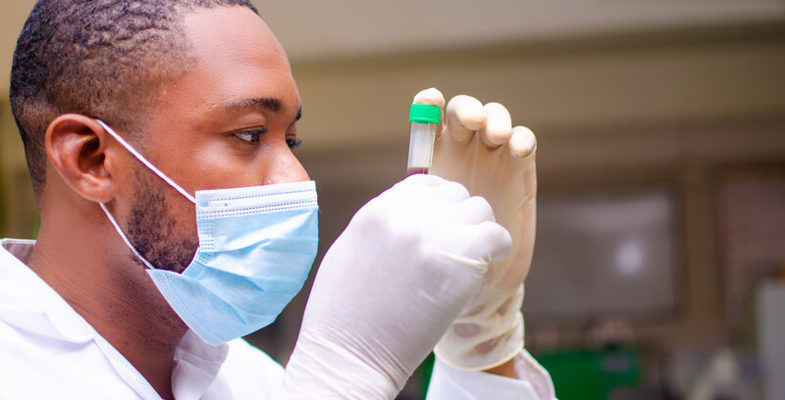- Homepage
- International
- Virtual resources
- Ghana video lecture series
- Haematology webinars
Haematology webinars
This lecture series supports the haematology membership and fellowship training programmes for the Ghana College of Physicians and Surgeons.
Ghana lecture series 2
Membership
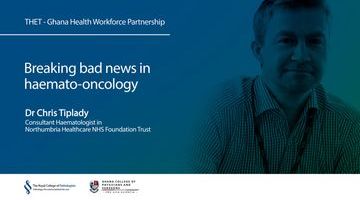
Dr Chris Tiplady
The talk will look at the difficult issue of death and dying. People, including doctors, can find this hard to talk about but it is so important to get it right for your patients and yourselves. We will look at models of breaking bad news and explore some of the complex cultural and medical issues around this.
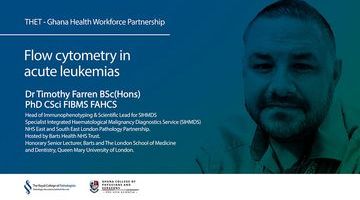
Dr Timothy Farren
The first half of this lecture covers the basic principles of flow cytometry and basic plot interpretation. While the second part of the presentation focuses on the clinical applications and, where possible, any interpretations for morphological review.
Fellowship
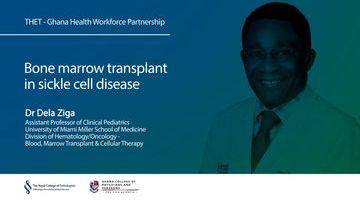
Dr Dela Ziga
This lecture will cover the main indications for transplant in sickle cell disease, provide a summary of techniques used in transplant and look at the complications of transplant in patients with sickle cell disease.
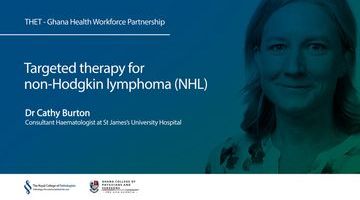
Dr Cathy Burton
In this lecture, the discussion focuses on the increasing number of targeted therapies for NHL, and most of these have fewer side effects. The laboratory techniques to diagnose and identify targets for which trials to decide the best use of the targeted therapies is required.
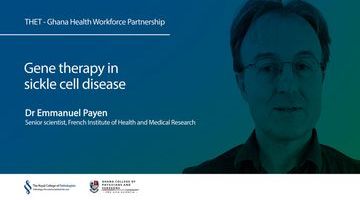
Dr Emmauel Payen
This lecture will aim to present the different gene therapy solutions for sickle cell disease, explain the underlying technologies, and give examples of pre-clinical and clinical achievements. Gene therapy's potential risks and benefits for hemoglobin disorders will be discussed.
This lecture series was created in 2022, but is still relevant for the haematology membership and fellowship training programmes.
2022 Lecture Series
Membership

Professor Alejandro Madrigal
There is no doubt that one of the factors implicated in the dramatic improvements in the outcome of unrelated donor transplantation over the years, is the advance in human leucocyte antigen (HLA) testing and matching, and the understanding of donor selection issues as well as the increase knowledge in the use of specific subpopulation of modified lymphocytes (CAR-T and NK cells) for the treatment of malignant haematological conditions. The presentation will cover several aspects of the polymorphism of HLA.
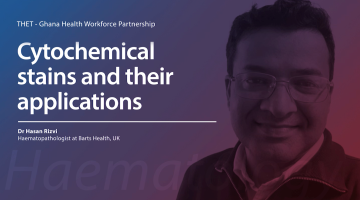
Dr Hasan Rizvi
This lecture highlights the development of cytochemical stains as a diagnostic tool in haematology diagnosis. It covers their past and current role in the diagnosis and classification of haematological disease within the context of the wider diagnostic service delivery in haematology as per current clinical practice.
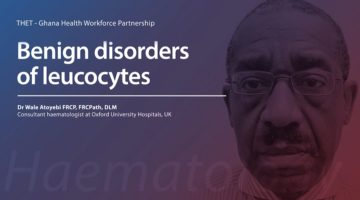
Dr Wale Atoyebi
This lecture will examine benign white cell disorders starting with the approach to evaluation and distinguishing features of benign versus malignant leucocytosis in patients. The common causes of congenital neutropenia and the approach to the adult with unexplained neutropenia will also be reviewed.
Fellowship
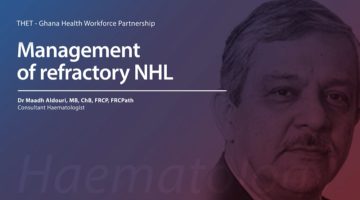
Dr Maadh Aldouri
In the last 20 years improvements in treating non-Hodgkin lymphoma have led to significant improvements in progression-free and overall survival, by incorporating immunotherapy with chemotherapy for most types of lymphoma. However, there is still a significant number of patients who are either refractory or relapse following first-line therapy, and second-line therapy usually only provides a palliative approach. At present, several options of effective salvage therapy are available, which include biological agents, as well as option of autologous stem cell transplant and CAR-T therapy.
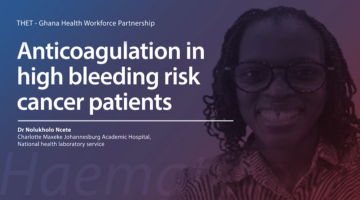
Dr Nolukholo Ncete
The lecture discusses the therapeutic options available for treatment of cancer associated thrombosis (CAT) and the evidence for the use of each drug. It then focuses on the conditions or scenarios that increase the risk of bleeding in patients on anticoagulation for CAT. Last, we discuss monitoring of these drugs and end of with a treatment algorithm based on platelet count.
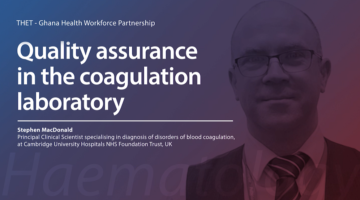
Stephen MacDonald
In this lecture we will discuss the theoretical and practical applications of deriving a quality assurance scheme in a medical laboratory – specifically those dealing with coagulation. We will discuss common sources of error, how to identify them and how to reduce them.

